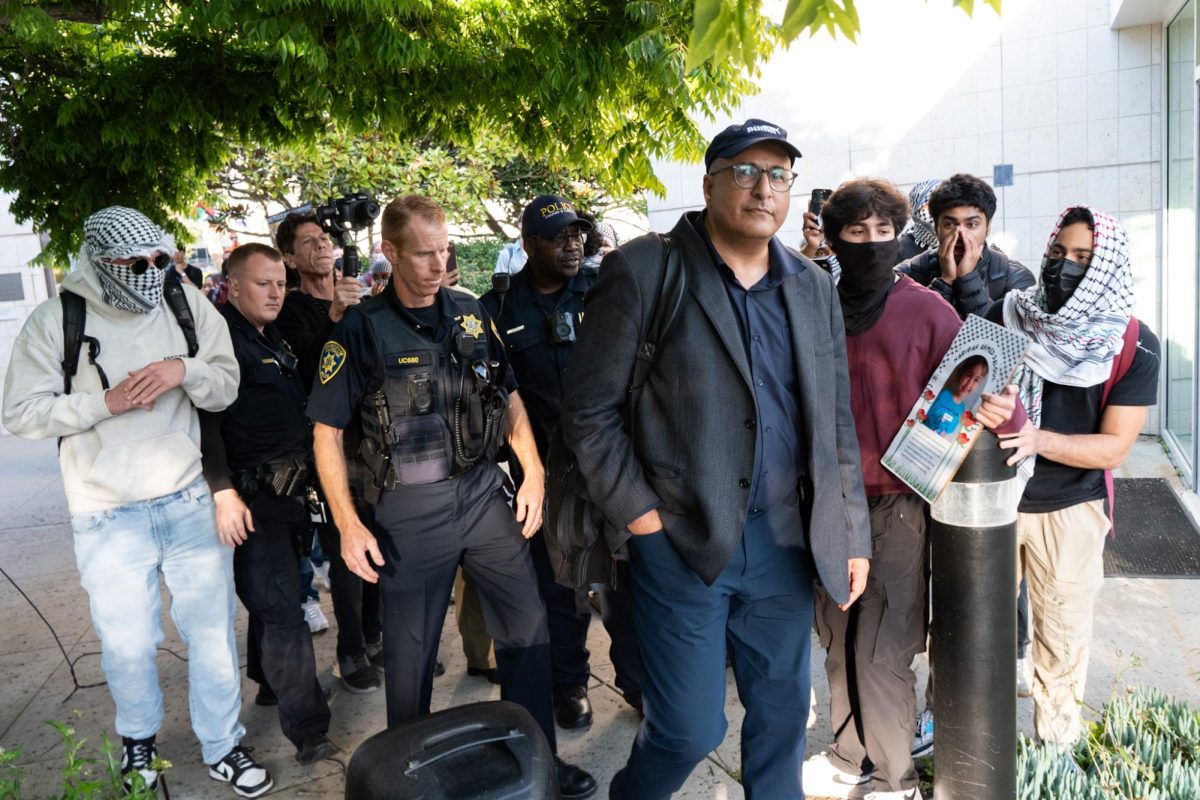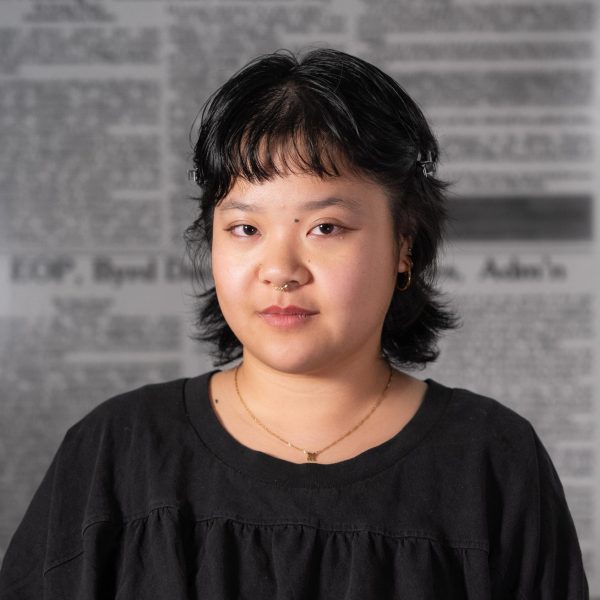This article was last updated on May 25 at 9 p.m. For corrections, see below.
At around 3:45 p.m. on Tuesday, May 20, UC San Diego Chancellor Pradeep Khosla and Academic Senate Chair Olivia Graeve sent out a campus-wide email with the subject line: “Joint Message from Chancellor Khosla and Academic Senate Chair Graeve Regarding Event Disruption.” Their message addressed two protests held yesterday at 4:30 p.m. by Students for Justice in Palestine San Diego and the Faculty Defense Group. Attendees protested against the School of Global Policy and Strategy’s public lecture with the former Israeli ambassador for the Consul General of Israel in New York and the Tri-State Area, Ido Aharoni, at the Gardner Room.
“Last night, a group of protesters, many of them wearing masks, disrupted a public lecture by an invited speaker on our campus,” the message read. “This conduct is an affront to the mission of our university. It violates campus policies and our Principles of Community, and is antithetical to our values and the educational mission of UC San Diego.”
Khosla and Graeve reiterated these values: “We encourage every member of the Triton community to recommit to free expression that is enshrined in civility and decency for all.”
Their message also apologized to “those who experienced the disruption yesterday,” writing that they will be “reviewing this event to determine what steps we can take to try to prevent unacceptable disruptions moving forward.”
The UCSD Guardian reached out to University Communications for comment on its definition of “unacceptable” and how this investigation will proceed. On May 21, it wrote back: “UC San Diego is fully committed to upholding the constitutional right to free expression and supports and encourages peaceful protests. However, the campus also has issued time, place and manner policies to provide guidance on how such protests may take place. Obstruction or disruption of university operations and activities – such as what happened last night–is a violation of these policies.”
Khosla and Graeve’s message followed an email statement the GPS dean, Caroline Freund, sent at 2 p.m. to the students, staff, and faculty of GPS. Freund’s statement shared similar sentiments and offered office hours to GPS students interested in discussing the event.
“I want to acknowledge the disappointment and discomfort this caused for many in attendance, as well as for others in our broader community who were impacted,” Freund’s statement read. “The event did not meet our expectations — nor did it reflect the thoughtful, respectful engagement that we strive for in all of our public discussions. Let us continue to uphold the values that define our community: curiosity, compassion, and a shared commitment to a more peaceful and just world.”
The Faculty Defense Group sent The Guardian a statement in response to Khosla and Graeve’s campuswide notice on May 22. “The note sent to UCSD campus personnel by Chancellor Khosla and Academic Senate President Graeve is misinformed,” the group said. “The note accuses protestors of ‘crowding entryways’ and ‘effectively shouting down the speaker and forcing the event to end.’ These accusations are inaccurate. Our constitutional rights protect rights of assembly. The University should protect that right as well.”
GPS’s announcement of Aharoni’s lecture, titled “Israel Today: Threats and Opportunities,” sparked controversy; various community members spoke out against the event before May 19.
On Thursday, May 15, a group of GPS students penned an open letter addressed to GPS administration to voice their concerns over the event, especially the lack of representation of different perspectives. They cited that through this event, GPS was not sufficiently upholding its stated values of “Impact and Inclusion.” The letter received over 30 signatories.
“We question the legitimacy of this event because the complex security challenges, geopolitical dynamics, and emerging opportunities facing Israel are inherently intertwined with the Palestinian statehood,” the letter read.
The GPS students specifically requested the presence of a co-moderator, a live fact-checker, and a restructuring of the lecture to include Palestinian panelists, as well as two long-term policy pursuits on event guidelines and student involvement in event planning.
Though the letter was addressed to Director of GPS Nancy Gilson — the administrative point of contact for GPS students — their intended recipient was Dean Caroline Freund. Gilson was not involved in any aspect of the event. The students hand-delivered their message to Freund on Thursday, May 15, without any listed signatures.
An anonymous GPS student told The Guardian that at the time of the letter’s delivery, Freund suggested that concerned students should attend the event and silently walk out.
“It was Dean Freund that suggested to first, attend, but if we felt like it crossed a line, we should silently get up and walk out. So we did,” the student said. Eight students participated in this silent walk-out.
Freund told The Guardian after this article was published that she intended to make changes to the event per the student complaints, but she was unable to as she had received the letter only one business day before the event.
“I was supposed to be traveling on the day of the talk, but I delayed my trip to open the event and ensure there would be significant time for questions in lieu of finding a [counterpoint] discussant,” Freund wrote in her email statement to The Guardian. “I asked the speaker to call on students first, which he did. I would have liked to adjust the event more, but the time was limited.”
GPS students were not the only ones who shared their concerns about the event. On Sunday, May 18, the Faculty Defense Group released a statement announcing its protest against the event:
“Our aim in this protest is not to cancel or censor the speech of Ambassador Aharoni. Instead, we want to call attention to the one-sidedness of the event at a time when speech on our campus, and campuses everywhere, decrying the genocide perpetrated by Israel and enabled by the U.S., is being censored and criminalized.”
It emphasized in the statement that this protest would be peaceful and “consist of faculty holding placards and banners denouncing what Israel has done in Gaza” with tape over their mouths.
“Ambassador Ido Aharoni is hardly a scholar,” the statement read. “He is instead a master propagandist and a doctor of Orwellian newspeak, with a mission of justifying what is unjustifiable and concealing what is criminal.”
The Guardian was on the scene at the two protests yesterday. Attendees chanted, and some representatives gave speeches while the Faculty Defense Group held signs condemning Israel’s actions in Gaza and the University’s response to the 2024 Gaza Solidarity Encampment. Around 75 protestors attended.
According to Khosla and Graeve’s message, “The protesters crowded entryways and used amplified sound to effectively shout down the speaker and force the event to end.”
The Guardian did not witness any obstruction of entryways or sidewalks during the event until police sealed off the area at 6:17 p.m., blocking the path between entrances to the Gardner Room and preventing movement toward the west side of the Robinson Complex. Police allowed event organizers to pass.
Officers from the University of California Police Department and San Diego police were present starting at around 4:40 p.m., arriving in waves until 14 were on scene. Throughout the event, The Guardian heard from police officers that they had been called in to respond to an “increased patrol request.” The Guardian reporters also saw police threaten arrest and discuss whether or not to “hold back” protestors.
The Guardian is monitoring the GPS event, protests against it, and its fallout. Our coverage of the protests can be found here.
CORRECTION: This article was originally published on Tuesday, May 20, at around 9 p.m.; several parties have released additional statements in the days following. The Guardian has since made several corrections and updates:
GPS students sent The Guardian a clarification regarding Nancy Gilson’s lack of involvement in the original “Israel Today” event; The Guardian updated this piece accordingly on May 21.
Dean of GPS Caroline Freund also sent The Guardian a follow-up statement after we published this piece. Per Freund’s statement, The Guardian made two corrections on May 22, clarifying the event announcement and how the GPS students’ letter was received. These corrections are not a comprehensive reflection of her full statement; the rest of her perspective is reflected in our continued coverage.
On May 21, University Communications responded to The Guardian’s request for comment. On May 22, the Faculty Defense Group sent The Guardian a response to Khosla and Graeve’s additional statement. The Guardian updated this piece with both statements on May 25.












Sol • May 23, 2025 at 8:40 am
Hamas started Oct.7 killing 1200 and kidnapping 250 peaceful civilians, music festival goers, etc. Hamas has to be destroyed and hostages released. The said reality is that Hamas, as confirmed multiple times, wages it’s military operations from underneath mosques, hospitals, schools, etc. The sad reality is that despite Israel dropping leaflets, warning by phone, and verifying each bombing through aerial surveillance, Hamas fighters remain inside the population. They not only use children as human shields, but they benefit from the death of their own people since it allows then to wage nonsensical and perverted media and legal war against Israel who acts in self defense. The starvation, if and where it happens, is also because of Hamas stealing the humanitarian aid and killing their own people who try to approach the food. They sell it for profit, to recruit more people, including kids, into the fighting ranks.
So here you go, yelling “Free Palestine” will not save a single child there. Freeing Gaza from Hamas might. Make your choice.
Christina Johnson • May 22, 2025 at 4:37 pm
I am struck by a significant omission in the reporting: the article provides no substantive overview of Ambassador Aharoni’s actual remarks or perspectives during the event. The complete absence of a summary or direct quotes from the speaker undermines the journalistic responsibility to fully inform the campus community. Without this context, readers cannot fairly assess anything …
mark • May 21, 2025 at 12:12 pm
ido asshole-oni
Truth Teller • May 21, 2025 at 11:58 am
Are Khosla and Graeve lying in their statement or just misinformed? The whole statement is grotesquely Orwellian! To say that you are promoting free speech by silencing and persecuting those who speak the truth about genocide? Free speech for Zionist war criminals is promoted and paid for. But when someone objects to the mass murder inflicted on Palestinians, then it must be shut down. Sickening hypocrisy.
Sol • May 22, 2025 at 10:31 am
If you would have listened to Iso, you would learn why there is no genocide, who is to blame for civilian deaths in Gaza and what the Truth is. But it seems that you know it all, including the protocols.
Truth Teller • May 24, 2025 at 10:27 am
You are only confirming my usage of the term “Orwellian.” War is peace. Freedom is slavery. Ignorance is strength. Genocide is defense. Lies, lies, and more lies—while innocent people are being killed, you pretend it is justifiable. Shame on all those who support the mass murder and starvation in Gaza!